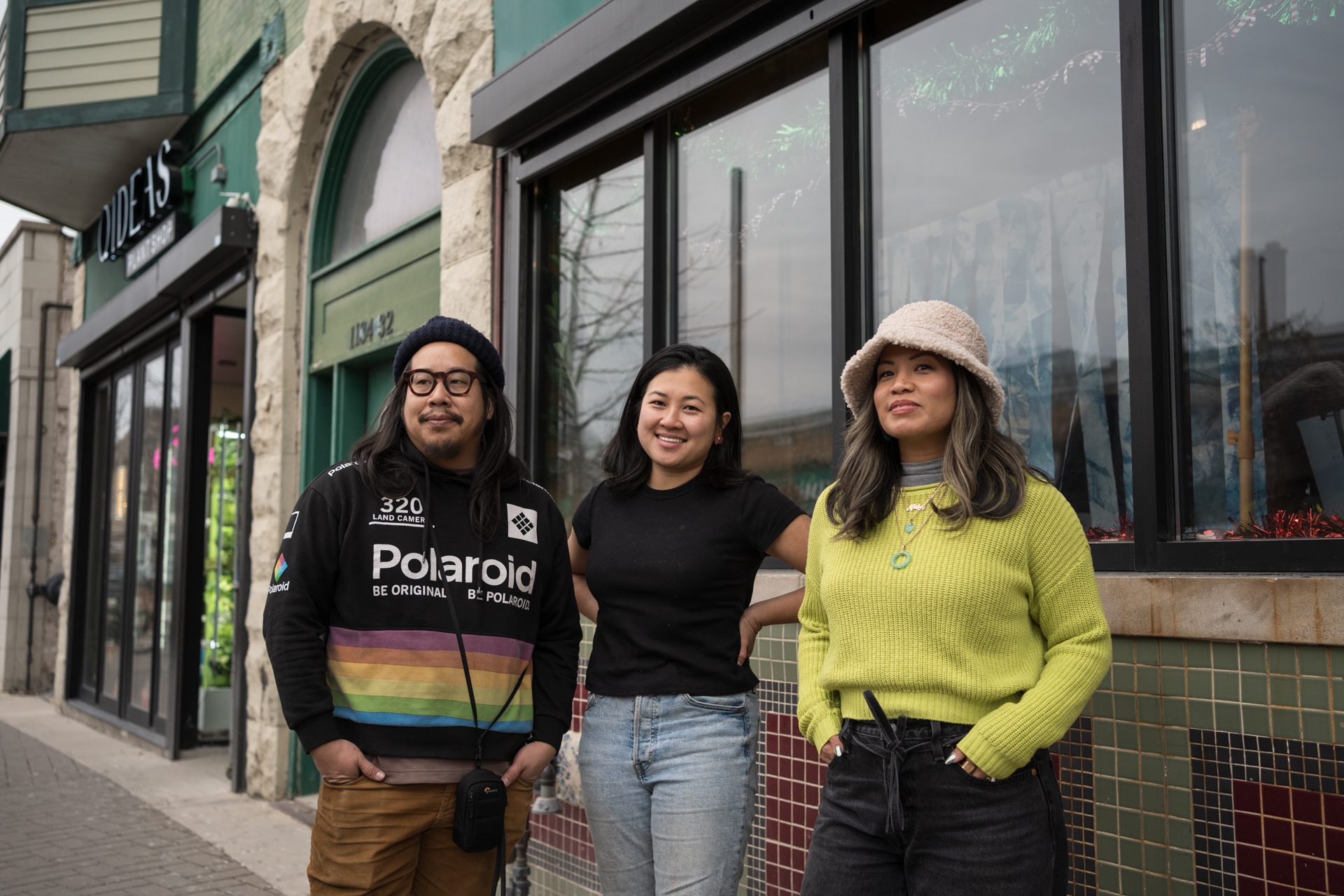 Max Herman/Borderless Magazine
Max Herman/Borderless MagazineHAIBAYÔ cofounders Hac Tran and Jennifer Pham and Qideas plant shop owner Ellen Duong are working to bring back the vibrancy that defined their childhood on Argyle Street.
When Jennifer Pham was younger, she and her brother would pretend to be mannequins in the window of their parents’ pharmacy on Argyle Street. Looking out the window, she recalls memories of a vibrant Argyle: kids playing nhảy dây thun, or jump rope, older adults walking around in their slippers and the scent of grilled meat wafting from the sidewalk while new-wave music blared out of the speakers of a local music shop.
“It just felt like Vietnam,” Pham said. “Everybody was outside. You walk outside and you smell phở and bún bò huế.”
Now, the intersection in front of Mini Thương Xá is mostly quiet, save for the flock of gray pigeons that often gather on the sidewalks. Argyle has struggled in recent years with declining foot traffic and increasing business vacancies. The challenges have been caused, in part, by gentrification, ongoing CTA redline renovations, the COVID-19 pandemic and anti-Asian hate.
News that puts power under the spotlight and communities at the center.
Sign up for our free newsletter and get updates twice a week.
Pham said friends, family and neighbors who used to live or visit the area no longer come around. For them, Argyle is “something of the past,” she said.
But Pham isn’t ready to let go of the neighborhood that helped raise her. For her, there’s a glimmer of hope for the once bustling block that transported her to the streets of Vietnam. That’s why she’s partnered with friends Hac Tran and Ellen Duong in hopes of spurring a resurgence to the street that holds fond memories from their youth — and is a symbol of their families’ immigrant and refugee roots.
Those hopes are slowly coming to life through HAIBAYÔ, Pham and Tran’s initiative to revitalize Argyle and preserve its cultural legacy.
“We want to be able to pass the torch to others and have it grow,” Pham said.
A new chapter of HAIBAYÔ inside a renovated plant shop
Pham and Tran started HAIBAYÔ in 2019. The initiative took shape as they hosted social pop-up events with DJs, musicians, artists and craft vendors to attract visitors back to Argyle.
Over the past few years, they have connected with Duong to host community activation events, including the inaugural Argyle Activation Walk in 2021.
Most recently, Pham and Tran moved HAIBAYÔ into the second room of Duong’s newly renovated plant shop, Qideas.
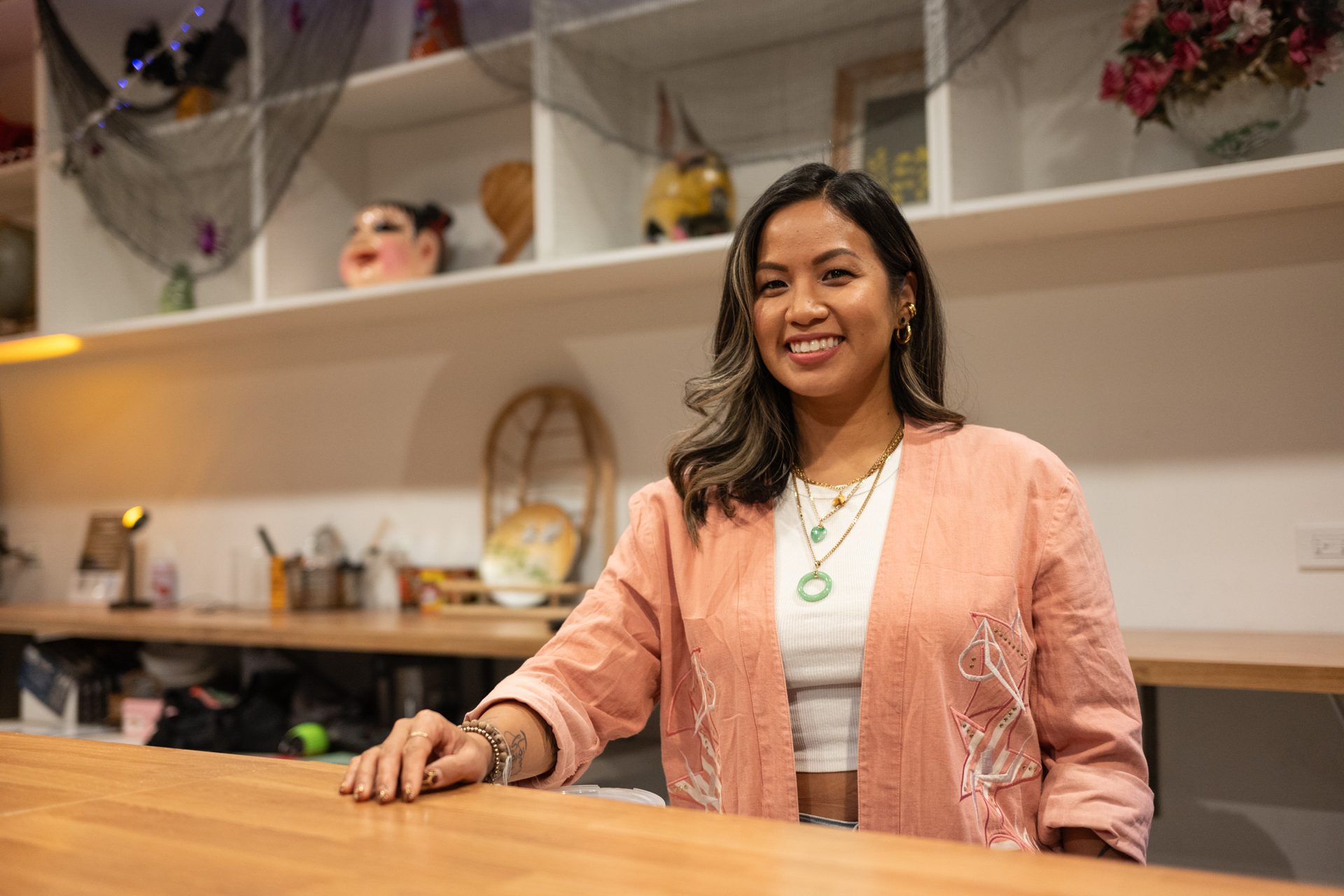
Like Pham and Tran, Argyle Street holds many memories for Duong.
Two years ago, Qideas plant shop — passed down to Duong by her parents — looked very different. Customers squeezed through the tightly arranged aisles to find everything from spoons and chopsticks to jasmine and calamansi plants.
Duong remembered how the shop offered unique flowers and plants that reminded many of the store’s Southeast Asian clientele of home. But Duong didn’t feel like the space, opened by her parents in 2002, was hers.
“I felt like I was living someone else’s dream and doing what they wanted,” Duong said.
She spent time away from the shop, getting her graduate degree and working as a therapist. During that time, she realized how much the shop meant to her. In May 2024, she reopened Qideas, renovating the space to focus on plants, art and gifts. Now, a neon yellow open sign welcomes passersby, and inside, small plants, modern artwork, brightly colored pottery and other small gifts line the walls and floor of the renovated shop.
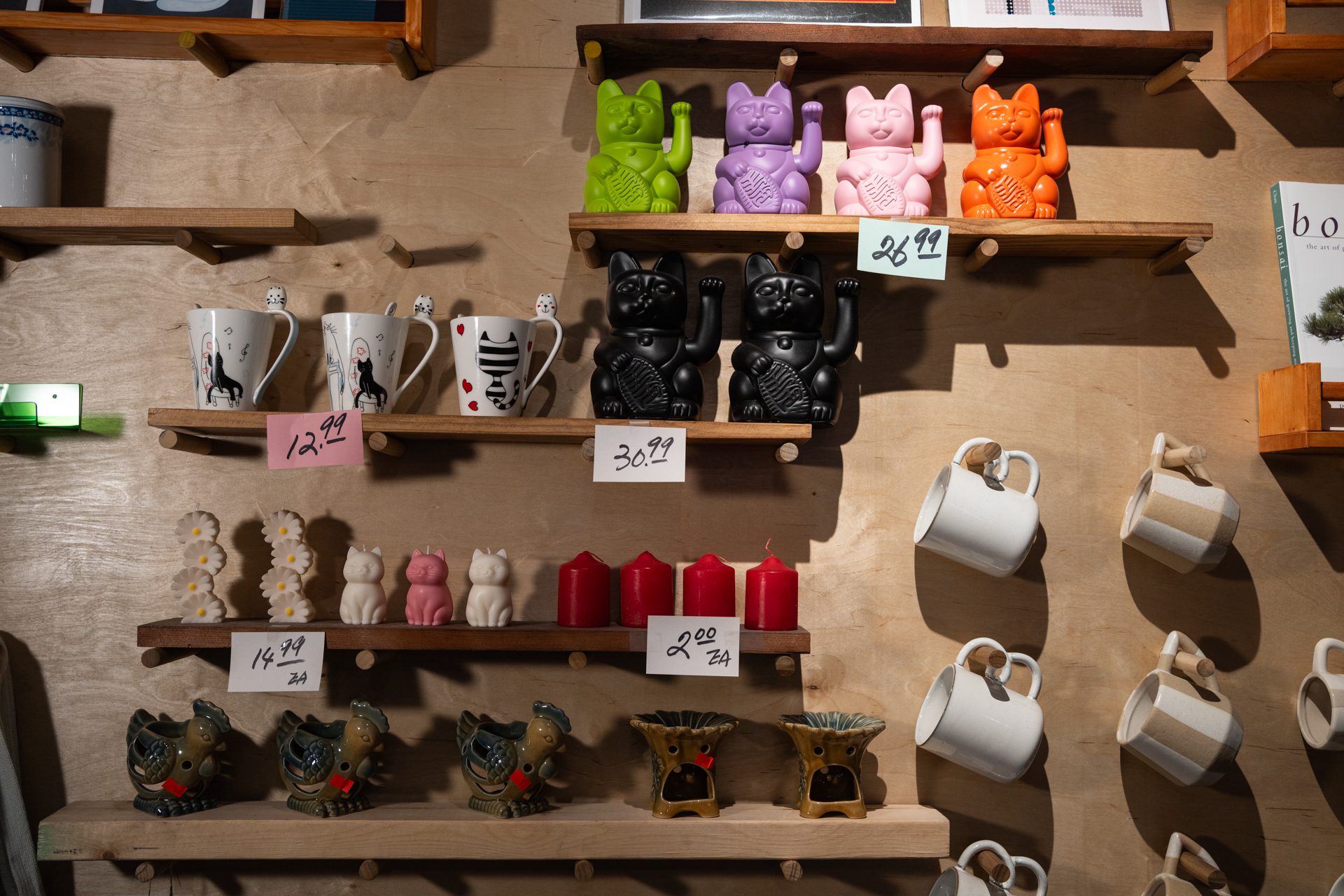
Duong said she hopes the rebirth of Qideas will encourage others to see and connect with Argyle differently — a sentiment she shares with friends Pham and Tran.
When deciding to renovate Qideas, Duong worked with Pham and Tran to apply for a City of Chicago Recovery Grant, which is now being used for both efforts.
“We did do things on the street without a brick and mortar,” Tran said. “But I think shifting the operations and the intentionality of HAIBAYÔ’s programming indoors allows us to have an institution of sorts for Argyle.”
Pham said there are few spaces like HAIBAYÔ’s on Argyle Street where people can come to do something other than eat or buy groceries.
Read More of Our Coverage
She and Tran hope to eventually open a cafe in the space, create an archive and museum area for Argyle’s history, and host activities and social services for older adults and local community members.
“We hope for this to be a community anchor,” Pham said. “People come here to eat, people come here to grocery shop, but there’s nothing to keep them here.”
Asia on Argyle
For decades, Argyle has been a port of entry for immigrants and Southeast Asian refugees in Chicago.
At the end of the Vietnam War in the ‘70s, millions of Southeast Asian refugees from Vietnam, Cambodia and Laos were displaced from their homes. Through the Indochina Migration and Refugee Assistance Act of 1975 and the Refugee Act of 1980, the U.S. opened its doors to Southeast Asian refugees and began one of American history’s largest refugee resettlement efforts.
Many Southeast Asian refugees found homes near Argyle in Chicago’s Uptown neighborhood. The neighborhood soon became known as “Asia on Argyle”— an economic corridor of immigrant and refugee-owned restaurants, jewelry stores, bakeries and grocery stores.
“It’s always been a commercial corridor of independent Mom-and-Pop immigrant and refugee entrepreneurs,” Tran said.
Now, nearly half of Uptown’s neighborhood is Hispanic, Latino, Black or Asian, and almost a quarter of residents there are immigrants, according to the Chicago Metropolitan Agency for Planning.
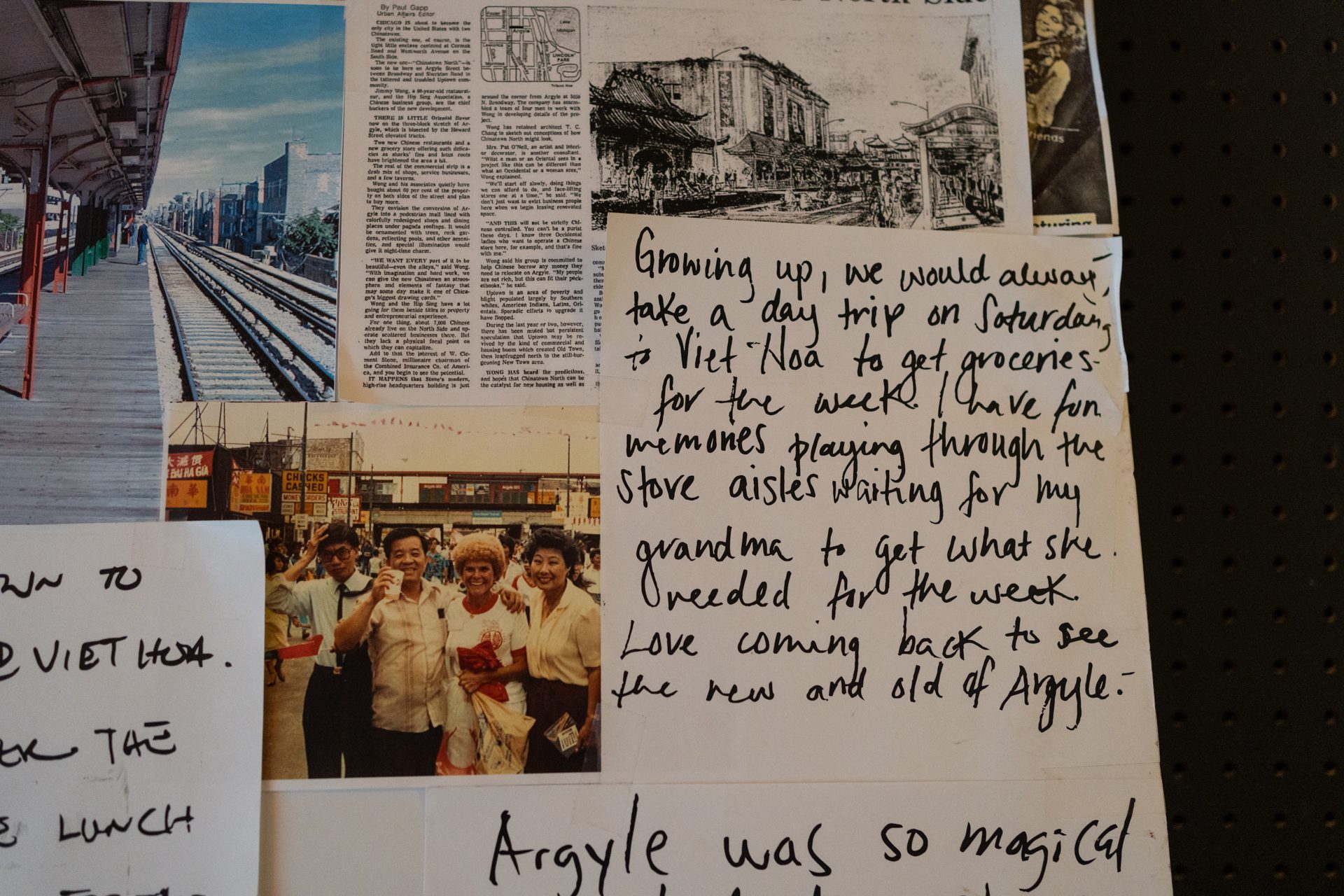
According to Pham, her parents opened Mini Thương Xá Pharmacy, originally called Saigon Pharmacy, in 1980 — which was the first Vietnamese-owned business on Argyle Street.
“First-generation immigrants and refugees in Argyle got so far, and it’s probably beyond what they were even expecting,” Pham said. “But…how do we continue this, how do we grow this, so that not just our kids are enjoying this but also our communities and our grandkids for generations to come.”
Over the years, challenges such as gentrification, transit renovations and the COVID-19 pandemic have exacerbated changes to the storied block.
According to the Urban Displacement Project, the average cost of rent in Argyle has increased by more than 30% from 2012 to 2017. In UDP’s map of gentrification in Chicago, Argyle and its surrounding residential area was marked as experiencing “ongoing displacement” and “advanced gentrification” — a process that occurs when “rents are so expensive that low-income people are excluded from moving in.”
Tran said another barrier to Argyle’s cultural preservation is succession.
“There’s so many vacancies,” Tran said. “A lot of the businesses are closing.”
Tran said that except for a few of the businesses on the street, such as Cafe Hoang and Mini Thương Xá Pharmacy, most do not have a successor to take over operations.
That was almost the case for Qideas and Duong, who wasn’t sure whether she wanted to take over her parents’ shop until recently.
“There are some families that have sent their kids away to college and have them do office jobs that don’t want to come back,” Duong said. “And it’s understandable. I also left because you want to create a space for yourself and your own identity.”
But their roots in the neighborhood and memories of Argyle have influenced the trio to breathe new life into the block.
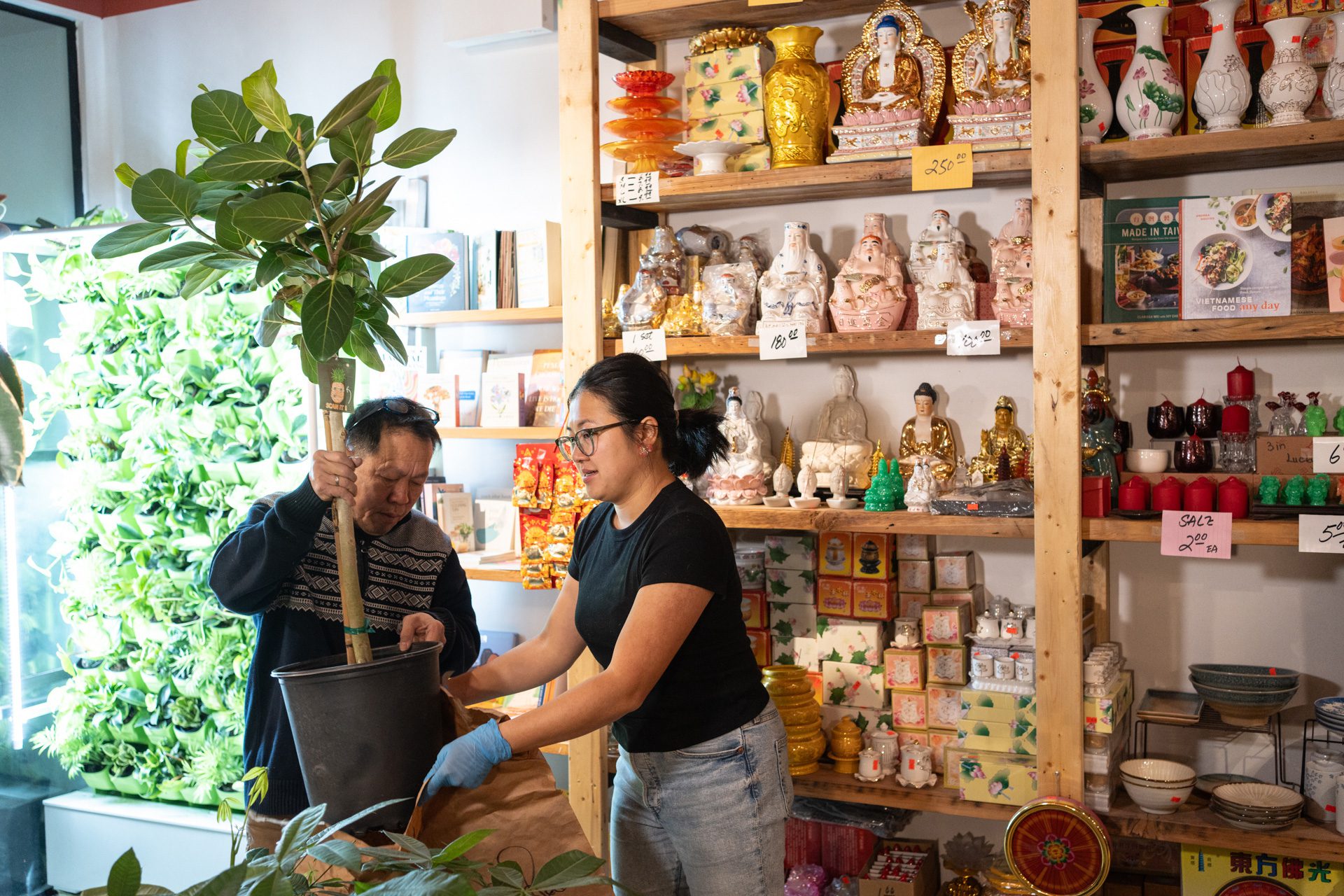
Tran hopes that having a space like HAIBAYÔ’s could be one piece of the puzzle to bridging intergenerational gaps in the community, kickstarting conversations between local business owners, inspiring young entrepreneurs and drawing people back to Argyle.
“For us, it’s about allowing for space for conversations to happen where they wouldn’t normally happen,” Tran said.
A New Wave
On a cold Saturday in November, inside HAIBAYÔ, Asian American and Pacific Islander vendors and small business owners filled the front and back rooms to sell handmade jewelry, ube and matcha pastries, original art, and stickers. Friends and community members stopped in for the weekly chợ thứ bảy, or Saturday Market.
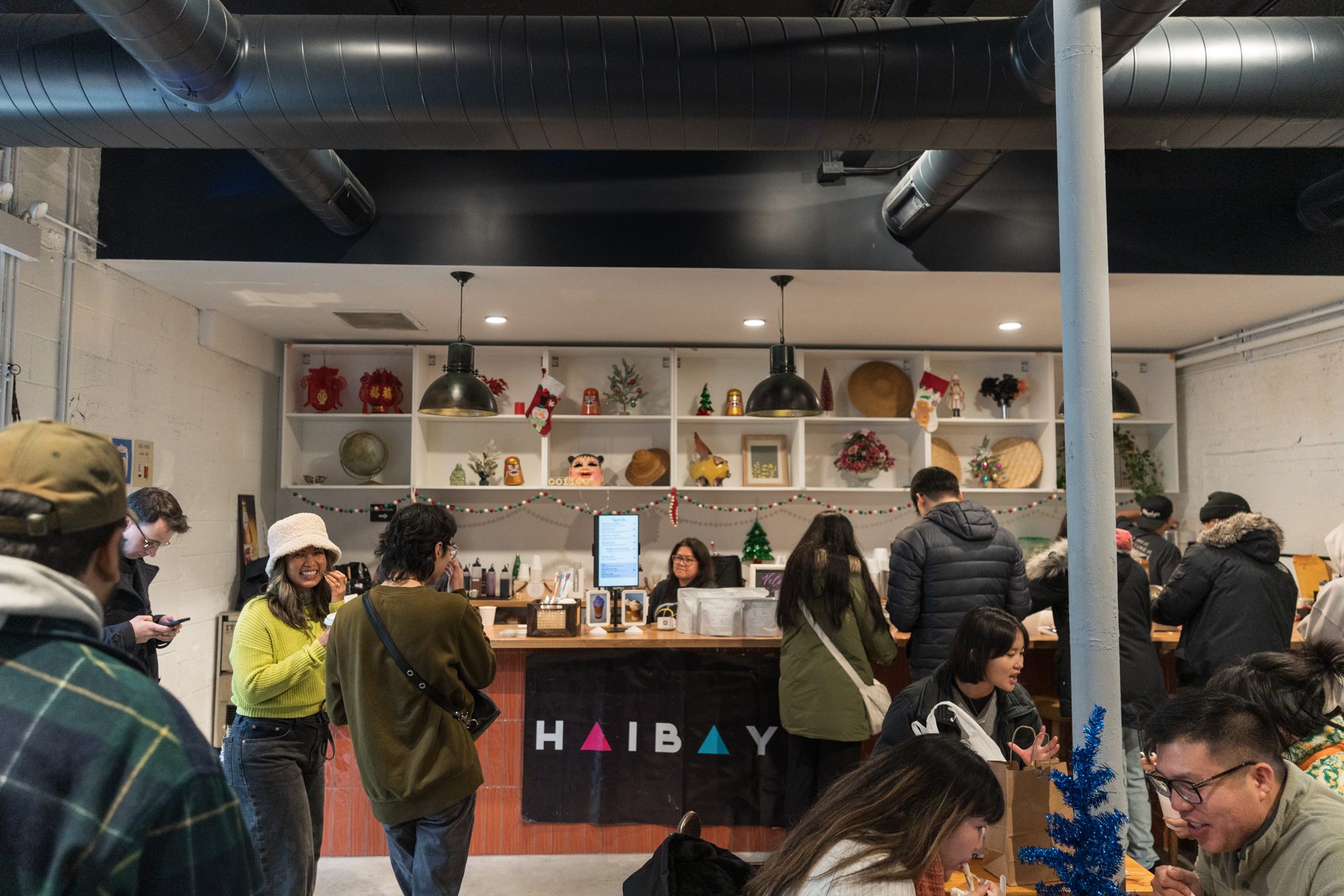
Vendors from young businesses, such as Veloria Coffee, a Filipino coffee seller, and Về Lại, a Viet-Lao comfort food business, set up shop in the space’s back room on a long, wood bar counter to sell noodles and drinks.
Although she once considered moving, Duong said what she has in Argyle and what the area has to offer is just too special to give up. She hopes more businesses will see Qideas and HAIBAYÔ and be inspired to build, rebrand, or start something of their own on the street.
“Our goal is to exist and be able to encourage others to see this place differently and connect with Argyle differently,” Duong said. “We want to be able to have people create…a deeper connection with this area so they become more involved and understand and see the beauty of this space.”
Outside the building, the voice of popular ‘80s Vietnamese singer Lilian Christensen fills the street alongside the techno backtracks of her cover, “I Wish.” Her voice emanates from the doors of Qideas and HAIBAYÔ — a little reminder of the new wave sounds the friends recalled from their childhood on Argyle Street.
HAIBAYÔ will fully open in Spring 2025. In the meantime, they are continuing to host pop-up events including a cacao ceremony on Jan. 11 and a mahjong-playing event on Jan. 19.
Katrina Pham is Borderless Magazine’s audience engagement reporter. Katrina can be reached at [email protected].

